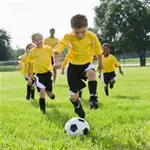
School-age children need 60 minutes or more of moderate-to-vigorous physical activity daily, according to an expert panel.
"The take-home message for parents is that it is very important to ensure that their children spend at least an hour a day in some form of appropriate physical activity," said Dr. William B. Strong, a pediatric cardiologist and Charbonnier Professor Emeritus at the Medical College of Georgia who co-chaired the panel.
"The important thing is that we have to get American children and adolescents active," said co-chair Dr. Robert M. Malina, research professor and an expert in growth and development at Tarleton State University in Stephenville, Texas. "The evidence is very clear that physical activity has decreased dramatically in the last 10 to 20 years."
Dr. Malina explained that, as the technology revolution of the 1980s produced more sedentary options for children, their caloric intake has essentially remained the same.
"Our children are just not burning up as many calories today," he said. "We need to help children increase the amount of time spent in moderate-to-vigorous physical activity. This means that parents, coaches, teachers and others who influence youngsters need to become active role models and get children involved in regular participation in physical activity."
The panel stated that increasing the level of habitual moderate-to-vigorous intensity physical activity in youth is a health promotion and a disease prevention strategy, and that restoration of physical education and other school and community-based programs could contribute mightily to that strategy.
Recommendations of the 13-member panel are published in the June 2005 issue of the Journal of Pediatrics. Panelists were convened by the Constella Group, Inc., a professional health services company headquartered in Durham, North Carolina, contracted by the Divisions of Nutrition and Physical Activity and Adolescent and School Health of the U.S. Centers for Disease Control and Prevention.
"We were asked to review the literature and find evidence of the impact of physical activity on the health and well-being of children and to make recommendations based on the evidence, not just on what we all believe to be beneficial," said Strong, founding director of the Medical College of Georgia's Georgia Prevention Institute, where researchers are exploring issues such as the impact of activity on children's weight and cardiovascular health.
The hope is that the evidence-based recommendations will be taken to heart by children, parents and schools, as well as an elite list of organizations that impact children's health, including the American Academy of Pediatrics, the American Heart Association, the National Association for Sport and Physical Education, the Robert Wood Johnson Foundation and the U.S. Department of Health and Human Services. Representatives of those groups attended the January 2004 meeting of the expert panel.
This article was prepared by Biotech Week editors from staff and other reports. Copyright 2005, Biotech Week via NewsRx.com. To see more of the NewsRx.com, or to subscribe, go to www.newsrx.com.
 Find activities for your ACTIVEkids.
Find activities for your ACTIVEkids.









Discuss This Article